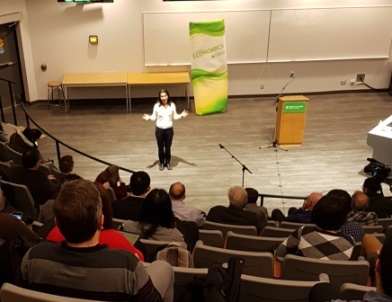
The Changing Economics of Electricity Markets
The increasing penetration of variable renewable energy sources, increasingly responsive demand, falling storage costs, and climate change policy are part of the confluence of factors that are fundamentally changing how electricity markets operate. Economists have been actively investigating how these developments are impacting electricity market outcomes and what these impacts imply for electricity market design and regulation. Professor Fowlie from the University of California, Berkeley highlighted some research insights from California that could be particularly relevant to ongoing policy discussions in Alberta in her lecture for the Institute for Public Economics and the Department of Economics' 23rd Annual Eric J. Hanson Lecture Series on December 5, 2017. The lecture was well attended by faculty, and representatives from the Government of Alberta and the energy business sector.
Her 2017 lecture, "The Changing Economics of Electricity Markets", touched on a number of recent changes and policy experiments that have impacted not only U.S., but also Canadian, electricity markets.
"Careful empirical studies are helping us to understand how complex electricity markets work in the real world", says Fowlie. She highlighted research that she and her colleagues have done to estimate the impacts of electricity sector restructuring on operating efficiency, market efficiency, and capital investment. She discussed work that assesses the environmental implications of recent increases renewable energy penetration and the shale gas boom. On the demand-side, she surveyed some recent field experiments which reveal the ways in which consumers' response to dynamic electricity pricing aligns with- and departs from- standard economic theory.
"Increasing penetration of variable renewable energy sources, an increasingly responsive demand side, falling storage costs, and more ambitious climate change policies (in some jurisdictions) are fundamentally transforming electricity markets". Fowlie says. "Past empirical research can help to inform market design and policy implementation in the face of these changes. But the rapidly changing landscape creates some unprecedented challenges ... and opportunities for more research."
Dr. Fowlie describes herself as "an applied working at the intersection of industrial organization, energy markets, and environmental economics. Much of my work investigates how market-based environmental regulation- and emissions trading programs in particular- are working in practice. I am also interested in the demand-side of energy markets and work that integrates methods and models from other disciplines into economic analysis of policy outcomes."
To view the slides of Dr. Fowlie's lecture see: The Changing Economics of Electricity Markets
To view the video recording of Dr. Fowlie's lecture see: The Changing Economics of Electricity Markets